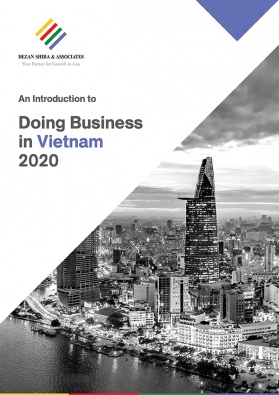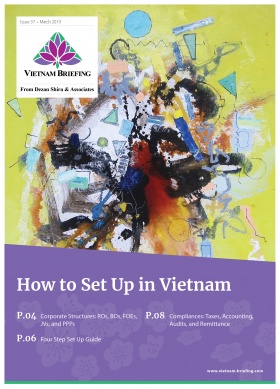COVID-19: Managing Your Human Resources in Vietnam
- Businesses across the globe are grappling with issues related to the COVID-19 pandemic.
- Human Resource functions have been stretched, having to deal with staff shortages while issuing guidelines for employees on day to day operations.
- We highlight some of the labor regulations in Vietnam in the context of the COVID-19 pandemic.
The COVID-19 pandemic has caused significant business disruption to businesses and offices alike throughout the country. Not only Vietnam but the issue has impacted businesses across the world, where the outbreak has meant the avoidance of gatherings in public, the closure of entertainment centers, movie theaters, bars, clubs as well as tourist sites.
The situation continues to remain fluid, with a large number of employees working from home. Labor shortages, work policies, flexible working arrangements, and travel restrictions have meant that Human Resource (HR) personnel are facing significant challenges.
In addition to this, rules and regulations are changing rapidly due to ongoing developments.
Most recently, Vietnam suspended the issuance of new work permits from March 17 and barred all foreigners (unless diplomats, officials, experts, high-skilled workers), regardless of their visas, from entering the country from March 22.
This has obviously created issues for companies that rely on foreign employees for their operations but has also created issues for the local staff.
HR departments have had to issue guidelines at short notice and manage employees to the best of their ability due to quick developments related to the global pandemic.
We list some HR issues that your business might face during this time.
Work stoppage
As per the labor code, if a business is required to temporarily suspend operations (maximum two years) due to an epidemic, such as COVID-19, the employer and employee can negotiate a salary during the suspension of operations. However, this cannot be lower than the regional minimum wage. The regional minimum wages were raised in January and vary from US$132 to US$192 depending on the region. This also applies to employees that cannot work due to contracting the virus.
However, Vietnamese laws currently do not explicitly state what businesses (such as bars, clubs, restaurants, movie theaters) are supposed to do when they are forced to shut down by the authorities. The Ministry of Labor, Invalids and Social Affairs (MOLISA) in its Official Letter 1064/LĐTBXH-QHLĐTL has stated that depending on the reasons for the work stoppage, the payment of salary during the work stoppage can be considered.
Leaves and social insurance
Regarding social insurance (SI) contribution, employees that take an unpaid leave of 14 days or more in a month, are not subject to SI participation and thus do not have to pay SI premium or enjoy SI benefits for the period. SI premium by the employer and employees are still applicable for employees that take annual leave or unpaid leave of less than 14 days.
The Vietnamese government, however, will cover all costs for workers that are in quarantine or are recovering from COVID-19. This applies to compulsory quarantine and medical isolation. Employers are not liable and the government’s SI fund would be used.
In addition, on March 16, MOLISA issued a document allowing businesses impacted by COVID-19 to suspend payments into the retirement and death gratuity funds of social insurance until June 30. If the pandemic lasts longer businesses will be able to apply for an extension. This applies to companies where 50 percent of staff have lost their jobs.
Business challenges
MOLISA on March 25 issued Official Letter 1064/LĐTBXH-QHLĐTL issued guidance on applying the labor laws during COVID-19.
Businesses that need to temporarily transfer employees to other jobs or departments, due to the pandemic, are permitted to do so but for not more than 60 working days a year unless the employee agrees. If the new wage is less than the previous job, the employee is entitled to receive the previous wage for 30 working days before receive the new wage, however, this must be at least 85 percent of the previous wage and not less than the regional minimum wage.
If the business is at risk to go into bankruptcy due to the prolonged work stoppage, the employer and employees can agree to suspend the labor contracts. This also applies to companies that have to limit production.
However, to terminate labor contracts, the business must give advance notice requirements, which is 45 days for indefinite term contracts and 30 days for definite term contracts and pay severance allowances.
Regulation during epidemic
If a business suspends operations for one month or longer because the employer is facing difficulties due to an epidemic, natural disaster, or fire, compulsory social insurance given in Law 58/2014/QH13 on social insurance is suspended if:
- At least 50 percent of employees participating in social insurance are not working; or
- The business suffers damage of 50 percent of total assets (excluding land value).
Unilateral termination
As per the Labor Code, an employer can unilaterally terminate the labor contract with an employee by issuing a notice three working days in advance when an employee is sick for:
- Twelve consecutive months (indefinitely labor contract);
- Six consecutive months (definite labor contract); and
- More than half of the contract term (labor contract of less than twelve months).
And remains unable to work after having received medical treatment.
Takeaways
In addition, businesses operating during this time should abide by all local laws and regulations. For example, Hanoi and Ho Chi Minh City authorities have limited all non-essential business activities and limited the gathering of more than 10 people. In addition, businesses can:
- Employ flexible working arrangements for employees including work from home options;
- Conduct visual and temperature checks for those employees entering the office;
- Educate staff about COVID-19 and prevention measures;
- Communicate internally to staff to manage fear and panic;
- Consider rotational shifts, have back-up sites ready and split teams;
- Develop contact tracing procedures to identify those that have been in contact with infected staff;
- Use virtual meetings with employees as well as clients. Have robust IT infrastructure in place to support conference/video calls;
- Ensure crisis management procedures are in place and review existing policies and procedures; and
- Identify critical business functions and develop recovery strategies.
The government may issue further regulations and clarity depending on developments related to COVID-19. We will keep you updated should any major significant changes are announced.
About Us
Vietnam Briefing is produced by Dezan Shira & Associates. The firm assists foreign investors throughout Asia from offices across the world, including in Hanoi and Ho Chi Minh City. Readers may write to vietnam@dezshira.com for more support on doing business in Vietnam.
- Previous Article Vietnam to Increase Labor Related Administrative Violation Fines
- Next Article Q&A: The Impact of COVID-19 and Guidance for Employers







